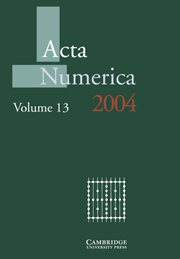Book contents
- Frontmatter
- Contents
- The calculation of linear least squares problems
- The numerical analysis of functional integral and integro-differential equations of Volterra type
- Sparse grids
- Complete search in continuous global optimization and constraint satisfaction
- Multiscale computational modelling of the heart
The numerical analysis of functional integral and integro-differential equations of Volterra type
Published online by Cambridge University Press: 04 August 2010
- Frontmatter
- Contents
- The calculation of linear least squares problems
- The numerical analysis of functional integral and integro-differential equations of Volterra type
- Sparse grids
- Complete search in continuous global optimization and constraint satisfaction
- Multiscale computational modelling of the heart
Summary
The qualitative and quantitative analysis of numerical methods for delay differential equations is now quite well understood, as reflected in the recent monograph by Bellen and Zennaro (2003). This is in remarkable contrast to the situation in the numerical analysis of functional equations, in which delays occur in connection with memory terms described by Volterra integral operators. The complexity of the convergence and asymptotic stability analyses has its roots in new ‘dimensions’ not present in DDEs: the problems have distributed delays; kernels in the Volterra operators may be weakly singular; a second discretization step (approximation of the memory term by feasible quadrature processes) will in general be necessary before solution approximations can be computed.
The purpose of this review is to introduce the reader to functional integral and integro-differential equations of Volterra type and their discretization, focusing on collocation techniques; to describe the ‘state of the art’ in the numerical analysis of such problems; and to show that - especially for many ‘classical’ equations whose analysis dates back more than 100 years - we still have a long way to go before we reach a level of insight into their discretized versions to compare with that achieved for DDEs.
Information
- Type
- Chapter
- Information
- Acta Numerica 2004 , pp. 55 - 146Publisher: Cambridge University PressPrint publication year: 2004
Accessibility standard: Unknown
Why this information is here
This section outlines the accessibility features of this content - including support for screen readers, full keyboard navigation and high-contrast display options. This may not be relevant for you.Accessibility Information
- 11
- Cited by
